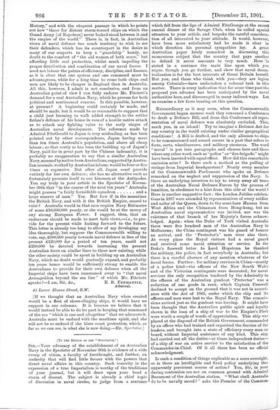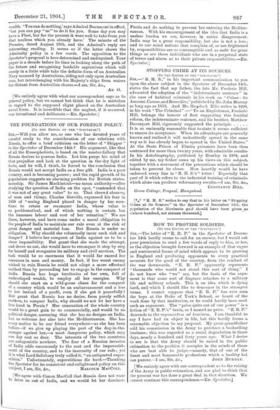[To THE EDITOR OP THE "SPECTATOR-'l
Sin,—Your advocacy of the establishment of an Australian Navy in the Spectator of November 30th is evidence of a wide sweep of vision, a faculty of forethought, and further, an audacity that will find little favour with the powers that direct naval affairs in this country. Such temerity in the expression of a true Imperialism is worthy of the traditions of your journal, but it will draw upon your head a storm of dissent. The subject is already a chief topic of discussion in naval circles, to judge from a sentence
which fell from the lips of Admiral FitzGeorge at the recent annual dinner Of the Savage Club, when he called special attention to your article, and, bespoke the careful considera- tion. of all interested to your attitude. It would, however, have been more satisfactory, had he made it clear in which direction his personal sympathies lay. A great Australian paper lately remarked in discussing this momentous subject that the country that pays another to defend it never amounts to very much. Here is stated in a sentence the main line upon which you argue, though you go further, and show that naval decen- tralisation is for the best interests of Great Britain herself. But you, and those who think with you—they are legion among Colonials—have undertaken a colossal task in this matter. There is every indication that for some time past the proposal you advance has been anticipated by the naval authorities here, and discouraged in many indirect ways. Let us examine a few facts bearing on this question.
Extraordinary as it may seem, when the Commonwealth Government began earnest work they convened a Conference to draft a Defence Bill, and from this Conference all repre- sentation of naval defence was absolutely excluded. This, mark you, in an island! Try to imagine a Defence Act for any country in the world existing under similar geographical conditions ! A Bill is drafted, and the only allusion to ships to be commissioned and armed occurs in a part that refers to forts, carts, wheelbarrows, and military etceteras. The word " naval " is put into paragraphs and clauses here and there where any other word, such as "police " or "fire-brigade," might have been inserted with equal effect. How did this remarkable omission arise ? Is there such a method as the pulling of strings from Imperial headquarters ? Nearly every member of the Commonwealth Parliament who spoke on Defence remarked on the neglect and suppression of the Navy. Is there an underlying intention to try to sweep away all trace of the Australian Naval Defence Forces by the process of inanition, in obedience to a hint from this side of the world ? Here is another suggestive fact : the London Jubilee celebra- tions in 1897 were attended by representatives of every soldier and sailor of the Queen, down to the semi-bare llaussa from West Africa and the Chinaman from Hong-kong, but no Australian naval representative was invited, nor was the existence of that branch of her Majesty's forces acknow- ledged. Again: when the Duke of 'York visited Australia there were five hundred men of the Australian Navy in Melbourne; the China contingent was his guard of honour on arrival, and the 'Protector's' men were also there. At every place the Royal visitors had a naval guard and received some naval attention or service. In the Duke's farewell letter to Lord Hopetoun he thanked the military, the police, in fact everybody in Australia; but there is a careful absence of any mention whatever of the ilaval forces. Further: for military services in China—mostly of a police kind—the officers of the New South Wales and of the Victorian contingents were decorated; for naval services the only recognition tendered by the Admiralty to the officers of the Australian gunboat 'Protector' was a reduction of one grade in rank, which Captain Creswell declined to accept on the ground that it was not in accord- ance with the Act of 1865, under which the ship and its officers and men were lent to the Royal Navy. The commis- sions arrived just as the gunboat was leaving. It might have been thought that the Australian public spirit and loyalty shown in the loan of a ship of war to the Empire's Fleet were worth a couple of words of appreciation. This ship was placed at the disposal of the British Government, commanded by an officer who had trained and organised the Service of the lenders, and brought into a state of efficiency every man on board, without Imperial assistance of any kind. This ship had carried out all the duties—at times independent duties— of a ship of war on active service to the satisfaction of the Commander-in-Chief. Of it all there has been no official acknowledgment.
Is such a condition of things explicable as a mere oversight, or is there an intelligible and fixed policy underlying this apparently persistent course of action? You, Sir, in your daring contention are not on common ground with Admiral Beaumont of the Australian station. "What shall Australia do to be navally saved ? " asks the Premier of the Common-
wealth. ''You can do nothing,' says Admiral Beaumont in effect, 'but you can pay." us" to do it for you. Some day you may have a Fleet, but for the present it were well to take from you that -nucieius which you already have.' The minute of the Premier, dated August 28th, and the Admiral's reply are interesting reading. It seems as if the latter shows the Admiralty policy in a few words. The opposition to the Spectator's proposal is here determined and undisguised. Your paper is a decade before its time in looking along the path of the future and recognising laudable aspirations which will surely in a little while take the definite form of an Australian. Navy manned by Australians, riding not only upon Australian seas, but interchanging with his Majesty's ships from waters far distant from Australian shores.—I am, Sir, &c.,
AB. 0.
[We entirely agree with what our correspondent says as to general policy, but we cannot but think that he is mistaken in regard to the supposed slight placed on the Australian naval force. It is incredible that the neglect, if it occurred, was intentional and deliberate.—En. Spectator.]











































 Previous page
Previous page